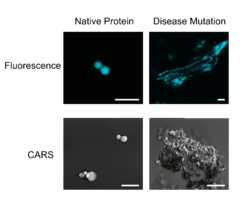Stressing out about granule proteins
MPI-P group leader Sapun Parekh and Brown University Professor Nick Fawzi have received $750,000 from the Human Frontier in Science Program (HFSP) over the next 3 years to study the “Structure and biophysics of disordered domains mediating RNP granules: from atoms to cells". The HFSP Research Grants fund international (intercontinental) research teams that propose cutting edge projects, which are multidisciplinary and where the expertise of each team member is critical for the project.
In the same way that a body contains functional organs, every cell contains functional organelles, each with a specific task. In the cell different organelles are generally separated from the surrounding cellular milieu by membranes or barriers. RNP (ribonucleotide) granules are an exception: this class of cellular organelles – containing RNA and disordered proteins – that have recently gained much attention, as they are so-called “membraneless organelles” – in contrast to almost every organelle in our cells. The molecular mechanisms that regulate their formation and stability are only now being elucidated. Moreover, certain mutations in proteins that make up RNP granules lead to known neuropathologies such as amyotrophic lateral sclerosis (ALS), also known as Lou Gehrig’s disease.
The Parekh and Fawzi team will create a novel molecular analytical toolbox and experimental protocols to quantify the protein-protein interactions and structural changes in RNP granules using a multiscale spectroscopic approach: from the single amino acid to whole protein level. The team will use a combination of in-cell vibrational and FRET imaging combined with in-cell NMR spectroscopy on granule proteins to examine the changes in protein structure and dynamics both in normal and disease-associated mutations.

“We are really excited to bring our different backgrounds to this very interesting and important problem. Our complementary tools will help clarify the molecular interactions that underlie and stabilize native stress granules and their disease mutants. It’s exciting that our project was selected in the highly competitive HFSP process,” said Parekh.
The Human Frontier Science Program Organization (HFSPO) awards some $30 million to support the top 3 percent of grant applications it receives. The 31 winning teams of 2018 were selected from a year-long selection process that started with more than 770 applications.












